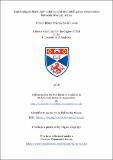Files in this item
Explaining military, law enforcement and intelligence cooperation between Western states
Item metadata
| dc.contributor.advisor | Argomaniz, Javier | |
| dc.contributor.advisor | Beasley, Ryan K. | |
| dc.contributor.author | Lewis, Olivier Rémy Tristan David | |
| dc.coverage.spatial | [4], 235 p. | en_US |
| dc.date.accessioned | 2018-11-08T17:11:26Z | |
| dc.date.available | 2018-11-08T17:11:26Z | |
| dc.date.issued | 2018-12 | |
| dc.identifier.uri | https://hdl.handle.net/10023/16419 | |
| dc.description.abstract | This thesis answers the question “Why does security cooperation occur between Western states?”. The basic answer is: “Because most state actors do not want their states to integrate”. In other words, cooperation occurs as a coping mechanism, as an imperfect substitute for integration. But the thesis does not only investigate the reasons for cooperation, what Aristotle called the final cause. The thesis also examines the material, formal and efficient causes of cooperation. Such an unorthodox causal explanation of cooperation is based on a Critical Realist philosophy of social science. The application of this philosophy to the empirical study of International Relation is rare, making this thesis original. Beyond the philosophy of social science, the thesis’ research design, many of the cases, and much of the data are also rarely used. The research design is an embedded multiple-case study. The states studied are the United States of America, France and Luxembourg. Within each state, the embedded subcases are three types of state security organisations: the armed forces, law enforcement and intelligence agencies. Rarely have these three types of security organisations been compared. Similarly, Luxembourg is seldom studied. Comparing different types of states and different types of state security organisations has not only allowed the main research question to be answered. It has also allowed temporal, spatial, national, and functional variation in cooperation to be identified and theorised. The empirical evidence studied includes participant observation (at the North Atlantic Treaty Organisation) and documents (e.g. state policy documents, annual reports by organisations, reports by parliaments and non-governmental organisations, autobiographies, books by investigative journalists, articles by newspapers and magazines). The thesis is also based on a score of elite interviews (e.g. with ambassadors, diplomatic liaisons, ministerial advisors, foreign ministry officers, military commanders, etc.), and the careful study of both declassified and classified archival records. | en_US |
| dc.language.iso | en | en_US |
| dc.publisher | University of St Andrews | |
| dc.rights | Attribution-NonCommercial-NoDerivatives 4.0 International | * |
| dc.rights.uri | http://creativecommons.org/licenses/by-nc-nd/4.0/ | * |
| dc.subject | Cooperation | en_US |
| dc.subject | Security | en_US |
| dc.subject | Armed forces | en_US |
| dc.subject | Law enforcement | en_US |
| dc.subject | Intelligence | en_US |
| dc.subject | Critical realism | en_US |
| dc.subject.lcc | JZ5601.L4 | |
| dc.subject.lcsh | International cooperation--Case studies | en |
| dc.subject.lcsh | Armed Forces--International cooperation | en |
| dc.subject.lcsh | Law enforcement--International cooperation | en |
| dc.subject.lcsh | Intelligence service--International cooperation | en |
| dc.subject.lcsh | Security, International | en |
| dc.subject.lcsh | Critical realism | en |
| dc.title | Explaining military, law enforcement and intelligence cooperation between Western states | en_US |
| dc.type | Thesis | en_US |
| dc.type.qualificationlevel | Doctoral | en_US |
| dc.type.qualificationname | PhD Doctor of Philosophy | en_US |
| dc.publisher.institution | The University of St Andrews | en_US |
| dc.publisher.department | Handa Centre for the Study of Terrorism and Political Violence (CSTPV) | en_US |
| dc.rights.embargoreason | Embargo period has ended, thesis made available in accordance with University regulations | en |
| dc.identifier.doi | https://doi.org/10.17630/10023-16419 |
The following licence files are associated with this item:
This item appears in the following Collection(s)
Except where otherwise noted within the work, this item's licence for re-use is described as Attribution-NonCommercial-NoDerivatives 4.0 International
Items in the St Andrews Research Repository are protected by copyright, with all rights reserved, unless otherwise indicated.


